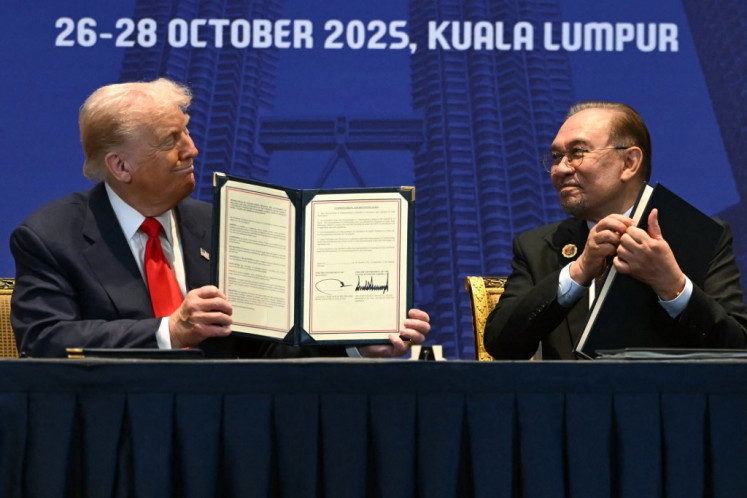Popular Reads
Top Results
Can't find what you're looking for?
View all search resultsPopular Reads
Top Results
Can't find what you're looking for?
View all search resultsRI, Norway to make LoI more binding
Indonesia and Norway are set to upgrade the level of the climate deal to bind the two countries in meeting their pledges to cut emissions amid protests from businesses who fear the deal would hamper investment
Change text size
Gift Premium Articles
to Anyone
I
ndonesia and Norway are set to upgrade the level of the climate deal to bind the two countries in meeting their pledges to cut emissions amid protests from businesses who fear the deal would hamper investment.
Indonesia and Norway signed a letter of intent (LoI) on climate change in May with Oslo extending US$1 billion in funds in exchange for emission cuts from deforestation.
The LoI would be upgraded into a legally binding agreement scheduled to be signed on Sept. 22 on the sidelines of the UN General Assembly in New York.
“With a binding agreement, Norway must pay the promised funds to a financial institution,” presidential special assistant on climate change Agus Purnomo said Thursday.
Indonesia, meanwhile, would have to meet the pledges as stipulated in the agreement.
“We will be obliged to stop issuing new licenses to exploit remaining peatland and natural forest areas. The peatlands must be protected regardless of their depth,” he said.
“However, companies that obtained business licenses before January 2011 will be exempted.”
Under the LoI, Indonesia would, among others, impose a two-year moratorium on exploiting peat and natural forests and would combat illegal logging and forest crimes.
Delegations from the two countries will also discuss the working plan in New York to realize the agreement.
“The first point of discussion is the establishment of an interim financial institution to enable Norway to disburse US$30 million in the first phase this year,” he said.
Recent talks in Jakarta failed to reach an agreement on a financial institution, with Indonesia stating that it wanted the money to be managed by local banks.
However, Norway said it preferred an international institution, such as the World Bank or UN REDD (Reducing Emissions from Deforestation and Forest Degradation) program.
The $30 million would be used to set up, among others, the independent council of REDD and the MRV (measurable, reportable and verifiable) system to ensure the emission cuts could be verified in the field.
The two institutions should be set up before the end of the year. In addition, the government is required to nominate a province to host the REDD pilot project by October at the latest.
“If there is no agreement on a financial institution, it is likely the disbursement of the $30 million will be made next year in line with the payment of $70 million,” Agus, who also heads the climate change division of the ruling Democratic Party, said.
The Indonesian delegation at the bilateral meeting with Norway in New York will be headed by Kuntoro Mangkusubroto, chief of the Presidential Work Unit for Development Monitoring and Control (UKP4).
Environmental law experts say upgrading the deal from an LoI to a binding agreement could have legal consequences if one party was in breach of the agreement.
“In legal terms, a binding agreement carries legal sanctions if one country fails to meet promises set out in the agreement,” Asep Warland Yusuf from Padjajaran University told The Jakarta Post.
“Both countries are bound to comply with the agreement.”
Asep said the government should be careful before seeking a legally binding agreement with Norway, as it should first discuss the issue with all climate change stakeholders in Indonesia.
“On the environmental side, we hail a stronger commitment to protect forests, but it’s a different story if we looked at the investment aspect because the government would not be able to issue new licenses even when the areas contain huge mineral deposits,” he said.










